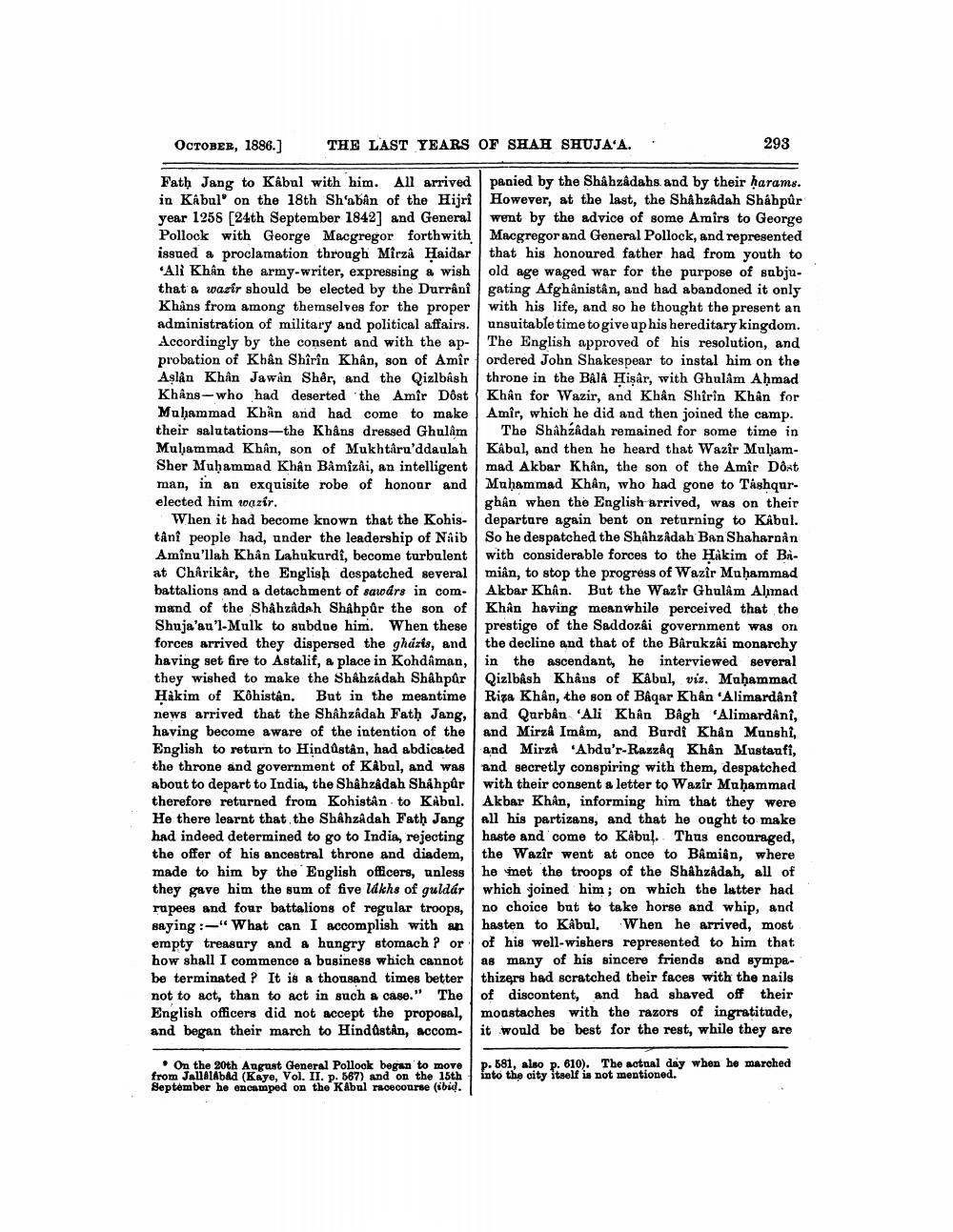________________
THE LAST YEARS OF SHAH SHUJA'A.
OCTOBER, 1886.]
Fath Jang to Kâbul with him. All arrived in Kâbul' on the 18th Sh'aban of the Hijri year 1256 [24th September 1842] and General Pollock with George Macgregor forthwith issued a proclamation through Mirza Haidar 'Ali Khân the army-writer, expressing a wish that a wazir should be elected by the Durrânî Khans from among themselves for the proper administration of military and political affairs. Accordingly by the consent and with the approbation of Khân Shîrîn Khân, son of Amîr Aşlân Khân Jawan Shêr, and the Qizlbâsh Khâns-who had deserted the Amir Dôst Muhammad Khan and had come to make their salutations-the Khâns dressed Ghulam Muḥammad Khân, son of Mukhtaru'ddaulah Sher Muhammad Khân Bâmîzâi, an intelligent man, in an exquisite robe of honour and elected him wazir.
When it had become known that the Kohistânî people had, under the leadership of Naib Aminu'llah Khân Lahukurdî, become turbulent at Chârikar, the English despatched several battalions and a detachment of sawars in command of the Shahzâdah Shahpûr the son of Shuja'au'l-Mulk to subdue him. When these forces arrived they dispersed the gházis, and having set fire to Astalif, a place in Kohdâman, they wished to make the Shâhzádah Shahpûr Hakim of Kohistan. But in the meantime news arrived that the Shâhzâdah Fath Jang, having become aware of the intention of the English to return to Hindûstân, had abdicated the throne and government of Kabul, and was about to depart to India, the Shâhzâdah Shahpûr therefore returned from Kohistan to Kabul. He there learnt that the Shâhzâdah Fath Jang had indeed determined to go to India, rejecting the offer of his ancestral throne and diadem, made to him by the English officers, unless they gave him the sum of five lakhs of guldár rupees and four battalions of regular troops, saying:"What can I accomplish with an empty treasury and a hungry stomach ? or how shall I commence a business which cannot be terminated? It is a thousand times better not to act, than to act in such a case." The English officers did not accept the proposal, and began their march to Hindustan, accom
On the 20th August General Pollock began to move from Jallalabad (Kaye, Vol. II. p. 567) and on the 15th September he encamped on the Kabul racecourse (ibid.
293
panied by the Shâhzâdahs and by their harams. However, at the last, the Shahzâdah Shahpûr went by the advice of some Amirs to George Macgregor and General Pollock, and represented that his honoured father had from youth to old age waged war for the purpose of subjugating Afghanistan, and had abandoned it only with his life, and so he thought the present an unsuitable time to give up his hereditary kingdom. The English approved of his resolution, and ordered John Shakespear to instal him on the throne in the Bâlâ Hisar, with Ghulam Aḥmad Khân for Wazir, and Khân Shirin Khan for Amir, which he did and then joined the camp.
The Shahzâdah remained for some time in Kabul, and then he heard that Wazir Muḥammad Akbar Khân, the son of the Amîr Dôst Muḥammad Khân, who had gone to Táshqurghân when the English arrived, was on their departure again bent on returning to Kabul. So he despatched the Shahzâdah Ban Shaharnân with considerable forces to the Hakim of Bàmiân, to stop the progress of Wazir Muḥammad Akbar Khân. But the Wazir Ghulam Aḥmad Khân having meanwhile perceived that the prestige of the Saddozâi government was on the decline and that of the Bârukzai monarchy in the ascendant, he interviewed several Qizlbâsh Khâns of Kâbul, viz. Muhammad Riza Khân, the son of Baqar Khân 'Alimardânt and Qurban Ali Khân Bagh 'Alimardânî, and Mirza Imâm, and Burdi Khân Munshi, and Mirza 'Abdu'r-Razzaq Khân Mustaufi, and secretly conspiring with them, despatched with their consent a letter to Wazir Muḥammad Akbar Khân, informing him that they were all his partizans, and that he ought to make haste and come to Kabul. Thus encouraged, the Wazir went at once to Bâmiân, where he met the troops of the Shahzadah, all of which joined him; on which the latter had no choice but to take horse and whip, and hasten to Kabul, When he arrived, most of his well-wishers represented to him that as many of his sincere friends and sympathizers had scratched their faces with the nails of discontent, and had shaved off their moustaches with the razors of ingratitude, it would be best for the rest, while they are
p. 581, also p. 610). The actual day when he marched into the city itself is not mentioned.




